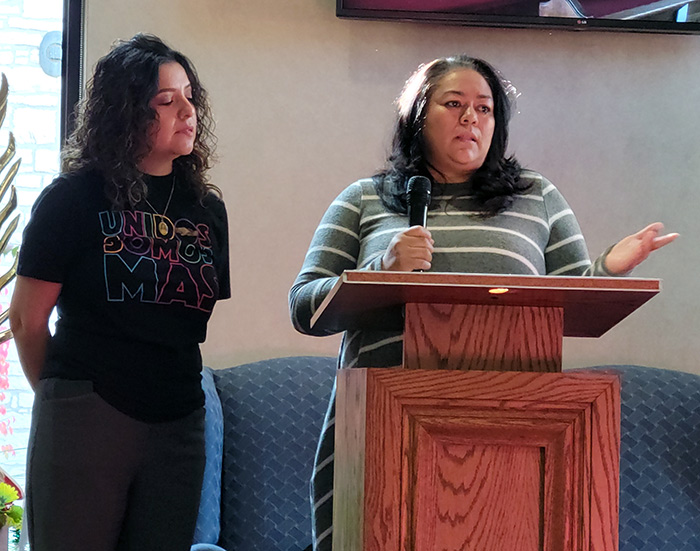
Gloria Mancilla, left, stands with Yasmin Gabriel during a press conference encouraging implementation of a Scott County Community ID. They are Quad Cities Interfaith leaders who spoke at St. Anthony Parish in Daveport Oct. 29.
By Anne Marie Amacher
The Catholic Messenger
DAVENPORT — Renting a place to live, the ability to do banking or to make a doctor’s appointment can be big challenges for people unable to provide identification. Some Scott County residents shared stories of their struggles to do the things that many other people take for granted during an Oct. 29 press conference advocating for creation of a Scott County community ID.
Quad Cities Interfaith and Alas de Esperanza Wings of Hope held the bilingual press conference in St. Anthony Parish Hall to inform community members about the importance of a community ID and to encourage the Scott County Board of Supervisors to implement it. Organizations that support the proposed ID include the Diocese of Davenport, St. Anthony Parish, St. Paul the Apostle Parish and Humility Homes and Services, all in Davenport. More than 220 individuals also support it.
Gloria Mancilla, a Quad Cities Interfaith leader and the coordinator of St. Anthony Parish Hispanic food pantry, said the community ID could benefit people who have been incarcerated, persons who have or are struggling with homelessness, and immigrants, among others. She believes at least 3,000 Scott County residents would benefit from obtaining a community ID. “And that is a conservative number.”
Quad Cities Interfaith (QCI) has talked with members of the Scott County Board of Supervisors and law enforcement officials about the proposed community ID. The supervisors plan to meet with QCI representatives at a roundtable later this month.
Yasmin Gabriel, a QCI leader, told the gathering about taking her daughter to the emergency room for treatment of a severe ear infection. Gabriel, who had just moved to the area from North Carolina, had expired identification and was not able to prove that she was the mother. The lack of ID delayed her daughter’s treatment, she said in Spanish, which Mancilla translated.
Tearing up, Gabriel shared another story about attempting to return an item to a big box store. She showed her mátricula, an ID issued by a Mexican Consular office. She couldn’t return the item because the employee was not familiar with the mátricula. Gabriel also noted that opening a bank account and renting an apartment require an ID.
Alex Manuel, a 12-year-old QCI youth leader, talked about his family’s efforts to change their address at the post office, which is not possible without an ID. “I think this ID would help contribute to the growth of this community,” Alex said.
Ashley Velez, executive director of Humility Homes and Services (HHSI) in Davenport, was unable to attend the press conference but Mancilla read a statement from her. She said a community ID would benefit many HHSI clients, who have a difficult time trying to obtain an ID for many reasons. “This legally accepted form of ID would assist in breaking this cycle for many utilizing our shelter and give them a greater ability to obtain safe, stable housing much sooner. That means, for some residents that you may have seen sleeping unsheltered, this ID could have stopped some of their episodes of homelessness, therefore causing less trauma and creating a better community.”
Karina Gomez, a QCI leader, called for county supervisors to work with the coalition to bring the community ID to Scott County. “Make Scott County more welcoming. Give people the basic right to an identity.”
“Now is the time to provide the tools to others who are marginalized,” said Alvaro Macias, a Moline, Illinois, alderman working with Rock Island County, Illinois, and Scott County to promote the community ID in their respective counties. “We may be two different states and different communities, but we can do this together. I will talk to elected officials in our region.” He noted that Johnson County, Iowa, has had a community ID since 2015. Other Iowa counties with community ID programs are Marshall and Story counties. Polk and Scott counties are working on the possibility.
A Scott County Community ID benefits all, not just vulnerable populations, Mancilla said. Any resident of Scott County would be able to apply for a Scott County Community ID. “Using this ID does not mean you are homeless. Showing a community ID does not mean you are just getting out of jail. Showing this ID does not mean you are undocumented. Showing this ID means that ‘I am proud to be in a community that welcomes everybody.’”
During a Q&A session, Mancilla encouraged people to spread the word, to read more about the county ID at https://qcinterfaith.org/ and to sign the petition online or in person in support of it. Also, contact county supervisors to express support.
Someone asked how people would obtain an ID. Other forms of non-photo identification would be required, Mancilla said, and the county supervisors and others would determine any additional guidelines. A person released from jail, for example, could use release papers and a parole officer as a form of identification. For a person experiencing homelessness, a letter of recommendation from an agency such as HHSI could serve as identification.
County supervisors could also help determine what would be included on the cards beside a photo, signature and address. In Chicago, bus fare can be added to the card. Some places have space to indicate allergies or organ donors.











